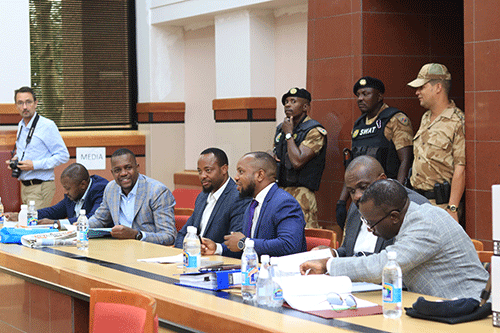Three judges of appeal yesterday dismissed an appeal by six Fishrot accused against the refusal of bail by Windhoek High Court Judge Shafimana Uietele in April last year.
Judge Uietele dismissed the bail application on the grounds that it will not be in the interest of society or the administration of justice to release the six, former minister of justice Sakeus Shanghala, his business partner and former managing director of Investec Namibia James Hatuikulipi, James’ nephew Pius Mwatelulo, former CEO of Fishcor Mike Nghipunya, Otneel Shuudifonya and Phillipus Mwapopi. They then approached the Supreme Court on the grounds that Judge Uietele misdirected himself in his judgement. They further contended that the fact that his oral judgement and the written judgement differed in material aspects, which constituted a material defect which should automatically set aside the entire judgement.
However, the Supreme Court Judges found that the paragraphs in the signed judgement upon which the appellants relied supplement the subscribed judgement in line with the correct factual position and in fact clears up a possibly obscure and ambiguous statement from the view of the fourth to sixth appellants.
Furthermore, Acting Judge of Appeal Theo Frank who wrote the judgement, in concurrence with Acting Judges of Appeal Jeremiah Shongwe and Kanalelo Mosito, said even if the finding on this issue is not correct and that it was simply a mistake and not an ambiguity or obscurity, the High Court was entitled to correct its mistake in terms of the Criminal Procedure Act as the judgement was signed by the judge in circumstances where it could not possibly prejudice the appellants in respect of appeal procedures that followed subsequent to its release.
In addition, the judges said, the reliance of the appellants on Articles 7 and 12 of the Constitution does not hold water.
“The constitutional rights contained in these articles can and must be enforced differently from any bail application,” Judge Frank stated and continued: If their liberty was interfered with in terms of a valid warrant of arrest in respect of a criminal charge, then the release can only flow from a successful bail application or from an acquittal in respect of the criminal charges.
The appellants’ further contention that all charges in relation to POCA (Prevention of Organised Crime Act) is flawed as officials of the Anti-Corruption Commission (ACC) investigated these charges and that the evidence in relation to these charges cannot be admissible, the Supreme Court judges said that when the ACC refer matters to the prosecutor general, the referral needs not only be in respect of the Anti-Corruption Act (ACA), but can also be in respect of other offences discovered during the investigation.
“The sections in the ACA fortify the position that where lawful investigations established facts that would sustain convictions or prosecutions in respect of more than one offence, it would be nonsensical to exclude it in respect of certain crimes but allow in respect of others. In their view, the judges said, the objections raised in this respect are not likely to substantially affect the admissibility of the evidence in respect of the POCA charges. This essentially means that the money laundering and racketeering charges will stick.
Consequently, and once it is accepted prima facie evidence, that the State has established a strong case to make against the appellants, the judges said, then their attack on the judgement of judge Uietele falters at the starting block as they failed to discharge the onus to prove they are suitable candidates for bail. Further, the judges said, considering the nature and magnitude of the allegations; the allegations of attempted interference with the evidence and the likelihood of this continuing should they be released on bail and the role players involved (whose conduct struck at the very basis of our society) – the risk that anyone of them will not stand their trial or continue to interfere with evidence simply cannot be excluded.
According to the judges, this is to date the largest corruption scandal since independence, if not in the history of Namibia. What is clear, they said, is that the appellants were involved in one way or another, according to the indictment, in an unlawful scheme to personally benefit from fishing quotas allocated by the State. Vast sums of monies, in excess of N$317 million are involved from which each appellant or accused benefitted to some degree to the tune of millions of Namibian dollars, the judges stated.
What is more, they said, it allegedly involves a syndicate comprising high profile officials and government ministers acting in cahoots with others to enrich the members of the syndicate over a number of years. “The allegations paint a picture of corrupt and criminal conduct on a massive scale in one of the biggest sectors of the economy, namely the fishing sector. This syndicate also involves high profile international personalities,” the Supreme Court judges stressed.
In the end, they said there is no reason to interfere with the judgement of judge Uietele and dismissed the appeal.
Senior advocate Vas Soni represented Shanghala, Hatuikulipi and Mwatelulo on instructions of Murorua, Kurtz, Kasper Inc and Thabang Phatela represented Nghipunya, Shuudifonya and Mwapopi, on instructions of Milton Engelbrecht. The State was represented by Cliff Lutibezi, assisted by Ed Marondedze.
-rrouth@nepc.com.na


